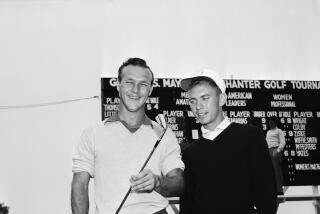These Two Are Unspoiled Sports
- Share via
It would never occur to Dana Quigley or Ed Dougherty to be unhappy. It would never occur to Quigley or Dougherty to complain about how much money he is making or to be hassled when a fan comes by to ask for an autograph on a golf ball and, oh, by the way, could you provide the golf ball? And the pen?
Quigley and Dougherty are golfers on the Senior PGA Tour. They are both 53. They have each made more than $3.7 million in their three years of playing geezer golf. They are both afraid they will wake up some morning and find this has all been a most wonderful dream and there isn’t really a senior tour with millions of dollars available for a golfer willing to take advantage of a second chance.
“You bet I’m lucky,” Quigley says. After the first round of the Toshiba Senior Classic at Newport Beach Country Club, Quigley is tied for the lead after shooting 65 and antsy to head back to the driving range because he didn’t hit enough greens.
Quigley has played 121 consecutive tournaments. “Why wouldn’t I take advantage of every day available to me to do this?” he says.
“Lucky?” Dougherty asks. “Darn right I’m lucky.” Dougherty has just shot a 1-under 70 and he isn’t thrilled with the score. He had been as low as three under during his round. He grumbles about some mishits and bad putts, but he brightens every time a man holds out a program to be autographed or a youngster offers a golf glove for his signature.
Dougherty fought in the Vietnam War. He was infantry fodder, an Army draftee, a naive kid who graduated from high school wanting to play pro baseball but accepted a job at the post office. Instead of getting drafted by a major league team, Dougherty was drafted into the Army.
When he was 20, Dougherty went to war. He and 112 other men in his unit were airlifted into a place called Kham Duc on the border of Cambodia and South Vietnam. It was in the middle of the Tet offensive. Dougherty and his mates were given two large vanilla-colored patches. They filled in all their vital statistics. As they got on the plane, a sergeant took one patch. The other went on the uniform.
“It turns out,” Dougherty says, “that those patches were to identify our bodies. The platoon that had gone in before us, they were all killed. Of the 113 guys that went in on our plane, 45 of us came out. Forty-five. I can’t really talk about it still. Let’s not.”
So he talks about being lucky.
When Dougherty was discharged, it was to Ft. Lewis,Wash.
Dougherty had grown up in Chester, Pa., a working-class Philadelphia suburb. Golf wasn’t played in his neighborhood. Baseball was. Dougherty was a pitcher who thought he was good enough for the majors. At Ft. Lewis, there was no baseball for Dougherty but there was a golf course. So Dougherty played. And played.
When he was discharged, Dougherty went home to Philly and a friend got him a job at a local golf club. Dougherty, without any formal training, ended up on the PGA Tour for 22 years. He won a tournament and he has won a senior tournament. He will not watch war movies, but otherwise Dougherty considers himself to have lived a blessed life.
The money Dougherty is making now is “important to me because my mother has Alzheimer’s and I can afford to give her the best care possible,” he says. Otherwise, Dougherty lives near the neighborhood where he grew up. His clothes aren’t fancy, his car isn’t fancy, his life isn’t fancy. It seems unreal to Dougherty that people want his autograph, that he is one of those pro athletes so many people think are spoiled and unfamiliar with real life.
Quigley says that when he was close to turning 50, he told people if he qualified for the senior tour, he would never take a week off.
And he hasn’t.
Quigley, a club pro in Rhode Island and Massachusetts most of his life, played four undistinguished years on the PGA Tour where he earned a total of $92,298. He has made more than $4.8 million on the senior tour and won four times.
Two years ago when Quigley wasn’t playing well, he talked to Bob Rotella, a sports psychologist, who advised Quigley to take a week off, go home, rest, put away the clubs.
“So I did,” Quigley says. “I went home from a tournament in Kansas City on Sunday and put my clubs in the closet. By Wednesday, I was crazy. I hadn’t withdrawn from the next tournament, in Indianapolis, so I got out my clubs and went. I was embarrassed to see Bob because I had promised him I wouldn’t play. But while I was at home, I kept thinking I had to be nuts not to take advantage of every moment out here. I still feel that way.”
It is with wide-eyed wonder that Quigley relates how his clothing sponsor, Tommy Hilfiger, ships him big boxes of new clothes every six weeks. “I just ship the dirty stuff home,” he says.
Quigley’s wife, Angie, travels with him. His son, Devon, and daughter, Nicole, children of a previous marriage, are back home in Rhode Island, where they call up friends whenever their dad is on TV. “My 87-year-old mother watches every shot I hit on TV,” Quigley says. “It’s like the whole family is living this dream.”
What fun it is to see athletes enjoy their work and understand, really understand, that as much talent as they have, they also are incredibly lucky to be professional athletes in this time, in this place.
After listening to the seriously selfish Frank Thomas and unbelievably clueless Gary Sheffield all week, a dose of senior golf is perfect.
*
Diane Pucin can be reached at her e-mail address: diane.pucin@latimes.com
More to Read
Go beyond the scoreboard
Get the latest on L.A.'s teams in the daily Sports Report newsletter.
You may occasionally receive promotional content from the Los Angeles Times.










